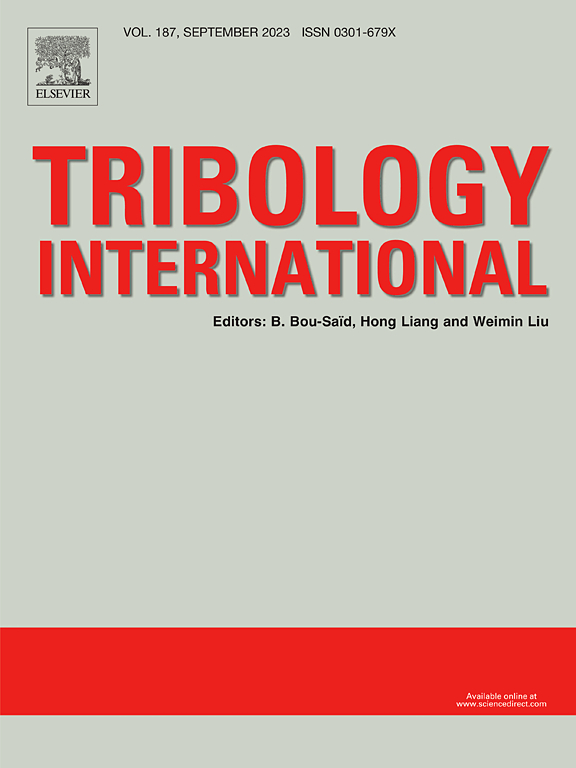Mucus-inspired biomass-derived carbon dots-based solvent-free nanofluid with polyelectrolytes networks toward excellent green lubrication
IF 6.1
1区 工程技术
Q1 ENGINEERING, MECHANICAL
引用次数: 0
Abstract
Mechanical friction and wear account for 23 % of global energy, highlighting a need for eco-friendly lubricants. Drawing inspiration from marine organisms' adsorption proteins, we have developed carbon dots-based solvent-free nanofluid. Incorporating hydrophilic polyelectrolytes, the nanofluid forms three-dimensional adsorption-lubrication networks, leveraging carbon dots' strong chelating affinity, synergistically enhancing lubrication. Using the UMT-3 TriboLab and a 3D optical profilometer, we assessed the tribological performance of nanofluid and remarkably reduced the friction coefficient by 47.3 % and wear rate by 90.8 % compared to PEG 200 (Polyethylene Glycol with an average molecular weight of 200). Additionally, the infrared camera detected that nanofluid as water additives, significantly reduce wear and heat generation, decreasing temperature rise by 4.7 times. This biomimetic approach paves the way for green, oil-free, and high-performance water-based lubrication technologies.
基于粘液启发的生物质衍生碳点无溶剂纳米流体与聚电解质网络,实现卓越的绿色润滑
机械摩擦和磨损占全球能源消耗的 23%,这凸显了对环保型润滑剂的需求。从海洋生物的吸附蛋白中汲取灵感,我们开发出了基于碳点的无溶剂纳米流体。这种纳米流体加入了亲水性聚电解质,形成三维吸附润滑网络,利用碳点的强螯合亲和力,协同增强润滑效果。我们利用 UMT-3 TriboLab 和三维光学轮廓仪评估了纳米流体的摩擦学性能,结果表明,与 PEG 200(平均分子量为 200 的聚乙二醇)相比,纳米流体的摩擦系数降低了 47.3%,磨损率降低了 90.8%。此外,红外热像仪检测到,纳米流体作为水添加剂,大大减少了磨损和发热,使温升降低了 4.7 倍。这种仿生方法为绿色、无油和高性能的水基润滑技术铺平了道路。
本文章由计算机程序翻译,如有差异,请以英文原文为准。
求助全文
约1分钟内获得全文
求助全文
来源期刊

Tribology International
工程技术-工程:机械
CiteScore
10.10
自引率
16.10%
发文量
627
审稿时长
35 days
期刊介绍:
Tribology is the science of rubbing surfaces and contributes to every facet of our everyday life, from live cell friction to engine lubrication and seismology. As such tribology is truly multidisciplinary and this extraordinary breadth of scientific interest is reflected in the scope of Tribology International.
Tribology International seeks to publish original research papers of the highest scientific quality to provide an archival resource for scientists from all backgrounds. Written contributions are invited reporting experimental and modelling studies both in established areas of tribology and emerging fields. Scientific topics include the physics or chemistry of tribo-surfaces, bio-tribology, surface engineering and materials, contact mechanics, nano-tribology, lubricants and hydrodynamic lubrication.
 求助内容:
求助内容: 应助结果提醒方式:
应助结果提醒方式:


